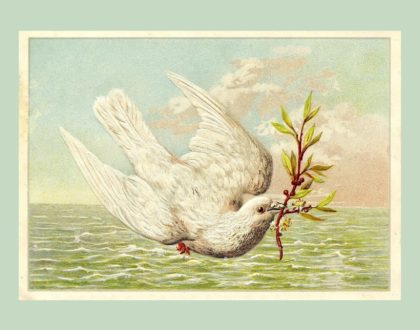Sojourns in Solitude: Prayer and the Festal Shout

by Pastor Gene
A wonderful passage in Peter’s second epistle reminds us that God’s “divine power has granted to us all things that pertain to life and godliness” (2 Peter 1:3). Jesus said, “I came that they may have life and have it abundantly” – life to the full (John 10:10b). Peter’s words are a beautiful reminder that everything that pertains to this life-to-the-full and to godliness has already been provided to us.
The best place to discover these things is alone with God in the desert, in times of quiet reading, meditating, confession and prayer.
Prayer, of course, is far more than petition. It’s primarily about communion, meeting God and having a conversation with Him. It’s speaking and listening.
In fact, silence is the natural response to being in the Father’s presence. David wrote, “My soul waits in silence for God only” (Psalm 62:1). And his son Solomon offered this advice: “Be not rash with your mouth, nor let your heart be hasty to utter a word before God, for God is in heaven and you are on earth. Therefore, let your words be few” (Ecclesiastes 5:2).
Sitting in the desert with God – what I call the disciples’ schoolhouse – it’s good to listen. A lot!
But prayer is a conversation. If we begin our quiet time with a reading – a short passage of Scripture to frame our time with God – and if we think carefully about what the Holy Spirit is teaching us about it, how He wants to change us through it, then it’s time to begin a conversation about it.
‘God, where am I falling short in this?’
‘Lord, what blind spots am I missing?’
‘Is this part of my life pleasing to You?’
Where would you have me change?’
‘Father, would you help me to be courageous in doing so?’
I’m suggesting that we treat God’s word as the continual source of life. And these things we learn from the Holy Spirit’s illumination in the quiet, we’ll take with us into our routine. Before Brother Lawrence began his daily work, he’d speak with God and ask Him to remain foremost in His mind. He’d ask, “Grant me your grace to stay in your presence. Help me in my labors. Possess all my affections.” His time alone with God allowed him to bring God with him into his community and into his work, joyfully.
Why? Because it’s in desert prayer that I find the joy that is my birthright in the New Birth.
Walking out of the desert having heard God’s still, small voice is our greatest source of rejoicing!
We’ve been with the living God!
Communed with Him!
Spoken to Him! Heard from Him!
And we walk out of the desert with a “festal shout!” Do you know what a “festal shout” is? It’s the shout a creation that knows its Creator!
“The pastures of the wilderness overflow,
the hills gird themselves with joy,
the meadows clothe themselves with flocks,
the valleys deck themselves with grain,
they shout and sing together for joy!”
(Psalm 65:12-13)
We see it here too:
“Shout for joy to God, all the earth;
sing the glory of his name;
give to him glorious praise!
Say to God, “How awesome are your deeds!
So great is your power that your enemies come cringing to you.
All the earth worships you
and sings praises to you;
they sing praises to your name.” Selah
“Come and see what God has done:
he is awesome in his deeds toward the children of man!”
(Psalm 66:1-3)
The believer who meets God in desert prayer leaves rejoicing – with a heart full of gratitude and lips pouring forth praise.
Is it any wonder that the Psalmist says …
“Blessed are the people who know the festal shout,
who walk, O Lord, in the light of your face,
who exult in your name all the day
and in your righteousness are exalted.”
(Psalm 89:15-16)
It is in the quiet – reading, meditating, sitting before Him, praying – that the Father makes known to us the path of life and gives me His joy. For truly,
“You make known to me the path of life;
in your presence there is fullness of joy.”
(Psalm 16:11)
To consider …
- Do you agree that prayer is a pathway to joy? Why or why not?
- What do you think Peter meant when he wrote that God’s “divine power has granted to us all things that pertain to life and godliness” (2 Peter 1:3)?
What does “life and godliness” mean to you?
Do you feel that you generally experience these qualities?
Why or why not?
What might you do to find them?
- I write: “Prayer, of course, is far more than petition. It’s primarily about communion, meeting God and having a conversation with Him. It’s speaking and listening. In fact, silence is the natural response to being in the Father’s presence.”
Do you agree?
What part, if any, does silence play in your devotional life with God?
How regularly do you meet Him in this way?
- Is it true that we find the joy that is our birthright in the New Birth in the desert? Why would this be true?
- Do you have a festal shout?
Recommended Posts

Resurrection Sunday
April 17, 2022

The Journey, Part 6: Life in the Waterless Wilderness
April 12, 2021

Noah’s Boat, Part 4: God’s Doves
May 31, 2020
Comments
Comments are closed.

That’s what I want in my morning time with the Lord-a loud shout of “yes ” … Of having been in his presence, of relational speaking and listening with good balance, walking away knowing I have been in the presence of Almighty God and that I have been changed. Lord, let me be passionate and protective about those early morning times with you, for there is true joy and abundant pleasure in having started my day that way with you …
What part, if any, does silence play in your devotional life with God?
Silence plays a big part in my devotional life. It gives me a chance to clear my mind and think clearly. It gives me an opportunity to hear myself. Sometimes life and conversation is like being on a jury. Many different people hearing the same facts, and yet having their own opinion. Talking to God alone helps me work out my own problems. Speaking alone to God allows me to be honest, letting Him in on even the littlest things that are bothering me. My verse for today is Psalm 57:1, Be merciful to me, O God, be merciful to me! For my soul trusts in You; and in the shadow of Your wings I will make my refuge. Until these calamities have passed by.
Have a blessed day everyone. My prayer for all of my fellow church friends is to do your best today to turn off the noise of the day and find your alone time with the Lord.
“Lord, what would you have me change?” That question is the essence of a childlike desire to please my Father in heaven, knowing that He is always good and that He desires only good things for me! Living transparently before Him is never meant to be burdensome; the center of His will is a place of abundant blessing and intimate communion. We can experience a foretaste of Heaven in that sweet sojourn of solitude if we purpose to pull away from everything and everyone else for an intentional time of listening.
The older in the Lord i grow, the more I cherish my quiet times and listening to the Holy Spirit. My Jesus is everything to me and i often tell Him I can’t live without Him! He us my All N All!! ❤️
I’m thinking of the verse in 2 Peter 1:3 and the question, what was Peter’s desire for his readers of this text? I don’t know if he had access to Paul’s letter to the Philippians, but my attention was drawn to chapter 3. As Paul reviewed his accomplishments as a Pharisee, he counted everything as loss and rubbish for the surpassing worth of knowing Christ Jesus as Lord. All the self righteousness he gained in the law was worthless but only what God imputed to him in Christ. I see a connection with Peter’s verse and verse 10 here, ” That I may know Him (experience the fullness of Christ) and the power of His resurrection, and may share His sufferings, becoming like Him in His death.” In Nehemiah chapter 8, the people were mourning as the book of the law was being read but the leaders, priests and Levites encouraged the to rejoice as this was a holy day unto the Lord. I love the latter end of verse 10, ” do not be grieved, for the joy of the Lord is your strength.”